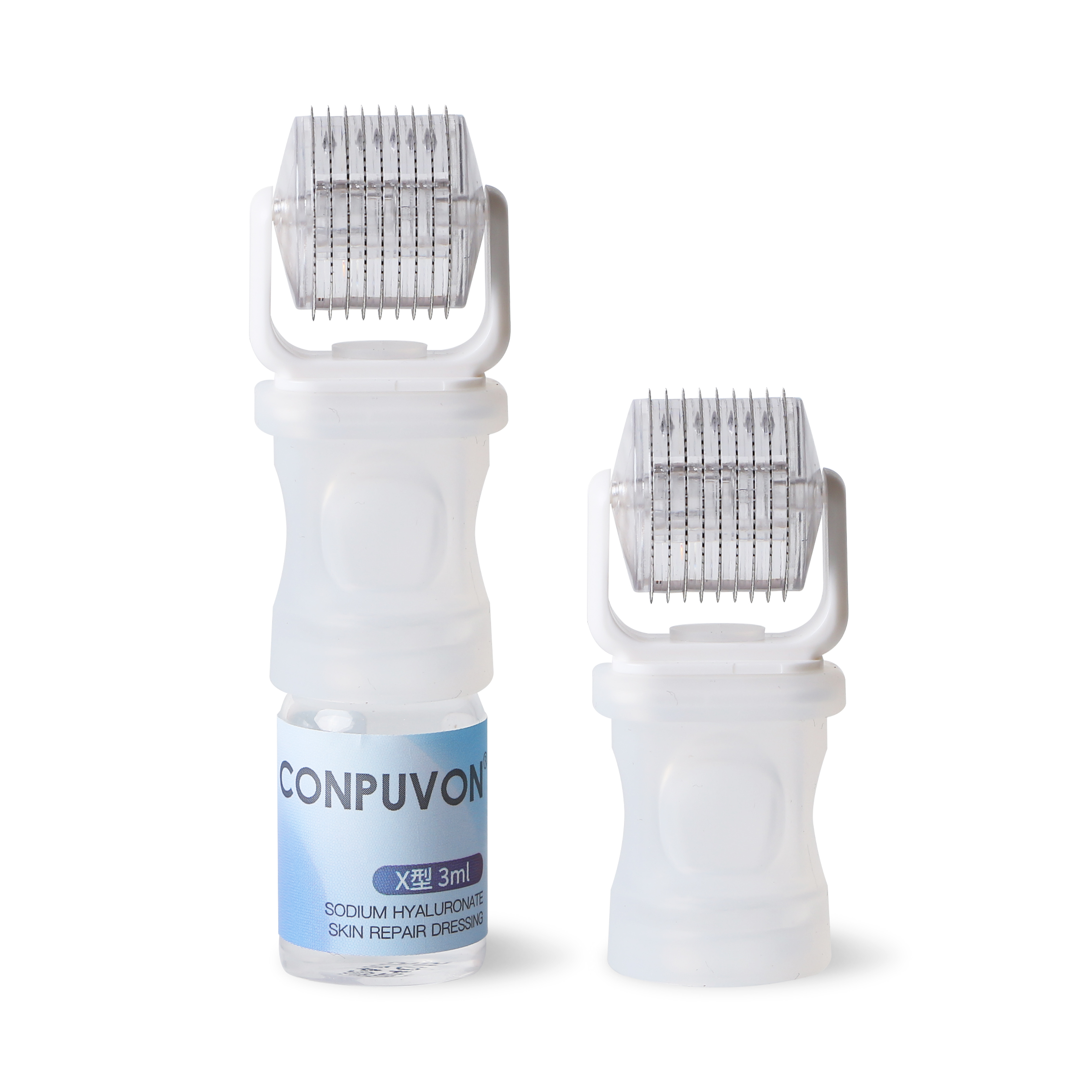Understanding derma rollers: What Are They?
Derma rollers, also known as microneedling devices, are skincare tools that feature a handle and a roller covered in small, fine needles. These devices are typically used to puncture the outer layer of the skin, creating controlled micro-injuries that promote natural collagen and elastin production. This process can lead to improved skin texture, reduced appearance of scars, and enhanced absorption of skincare products. While commonly used for cosmetic purposes, understanding their safety during pregnancy is crucial given the physiological changes that occur during this time.
Potential Risks of Derma Rolling During Pregnancy
● Increased Skin Sensitivity
Pregnancy brings about a myriad of hormonal changes, leading to increased skin sensitivity for many women. As a result, products and procedures that were once well-tolerated may now cause irritation or adverse reactions. Derma rolling, which involves penetrating the skin, might exacerbate this sensitivity, resulting in discomfort or longer recovery times. Therefore, pregnant women should exercise caution and seek medical advice before proceeding with such treatments.
● Risk of Infection
Another significant concern with derma rolling during pregnancy is the increased risk of infection. Pregnancy suppresses certain immune responses, making women more susceptible to infections. The micro-injuries created by a derma roller can become potential entry points for bacteria, leading to skin infections. Ensuring the skin tool's cleanliness and maintaining strict hygiene standards is imperative to mitigate these risks.
Consulting Your Doctor: Essential First Step
● Importance of Medical Advice
Before using a derma roller or introducing any new skincare product during pregnancy, consulting with a healthcare professional is imperative. A doctor can assess individual risks, taking into account personal medical history and pregnancy progression. Such a consultation provides an opportunity to discuss potential concerns and allows for a personalized evaluation of the procedure's safety.
● Personalized Recommendations for Safety
Your healthcare provider can offer specific recommendations based on your skin type and pregnancy stage. For instance, they may suggest alternative skincare treatments or modified derma rolling techniques to minimize risks. Listening to expert advice ensures both maternal and fetal health are prioritized, and empowers women to make informed decisions regarding their beauty routines.
Skin Sensitivity Changes in Pregnant Women
● How Pregnancy Affects Skin Sensitivity
During pregnancy, hormonal changes can cause various skin conditions such as hyperpigmentation, acne, and increased sensitivity. Skin may react differently to products and procedures that were previously non-irritating. These changes necessitate a reevaluation of a woman's skincare regimen and a cautious approach to introducing any new treatments, such as derma rolling.
● Impact on Skincare Routines
Pregnant women may need to adjust their skincare routines to accommodate increased sensitivity and other skin conditions. This might involve using gentler products, reducing the frequency of treatments, and avoiding certain ingredients altogether. Understanding these changes and adapting accordingly can help maintain healthy skin throughout pregnancy.
Approved Skincare Products for Pregnant Women
● Importance of Using Doctor-Approved Products
During pregnancy, ensuring that all skincare products are safe and approved by a healthcare provider is crucial. Some ingredients commonly found in skincare products, such as retinoids and salicylic acid, are not recommended for use during pregnancy due to potential risks to the developing fetus. Opting for doctor-approved products can help avoid any adverse effects.
● Safe Skincare Options During Pregnancy
Fortunately, there are numerous safe skincare options available for pregnant women. These include products with ingredients like hyaluronic acid for hydration and vitamin C for brightness. Additionally, using sunscreens with physical blockers, such as zinc oxide, can protect sensitive skin from UV damage without causing harm to the mother or baby.
Microneedling Safety During Pregnancy
● Safety Considerations for Microneedling
Microneedling, a procedure similar to derma rolling, involves using fine needles to create controlled skin injuries. While some practitioners consider it safe during pregnancy with appropriate modifications, it's essential to consult a healthcare provider before proceeding. Microneedling should be performed by a skilled professional, and any numbing agents used should be pregnancy-safe.
● Importance of Professional Consultation
A professional consultation is vital for ensuring that any microneedling procedure is conducted safely during pregnancy. Trained practitioners can provide guidance on suitable techniques and products, minimizing any potential risks. This expert advice can help pregnant women achieve desired skincare results without compromising their health.
Benefits of Low-Depth Microneedling Techniques
● Explanation of Micro-Channeling
Micro-channeling is a form of microneedling that involves using a derma roller with shorter needles to create shallow channels in the skin. This technique can stimulate collagen production while minimizing discomfort and recovery time, making it a potentially safer option for pregnant women seeking microneedling benefits.
● Comparison with Traditional Microneedling
Traditional microneedling often employs longer needles, which penetrate deeper into the skin and may pose higher risks during pregnancy. In contrast, micro-channeling offers a gentler alternative that can still improve skin texture and product absorption, with fewer side effects. Pregnant women may find this approach more suitable for their skincare needs.
Avoiding Topical Numbing Agents: Why It Matters
● Risks Associated with Lidocaine
Many microneedling procedures involve the use of topical numbing agents like lidocaine to alleviate discomfort. However, lidocaine and similar substances may not be safe for use during pregnancy. Potential absorption through the skin could pose risks to the developing fetus, making it essential to avoid these agents when derma rolling during pregnancy.
● Alternatives to Numbing Agents
Pregnant women seeking pain relief during derma rolling can explore alternative methods that do not involve topical numbing agents. These might include using ice packs to numb the area temporarily or opting for low-depth microneedling techniques that naturally cause less discomfort. Open communication with a healthcare provider can help determine the most appropriate pain management strategy.
Post-Care and Monitoring After Derma Rolling
● Importance of Aftercare for Skin Health
Following a derma rolling session, proper post-care is crucial for maintaining healthy skin and preventing complications. This includes keeping the treated area clean, avoiding harsh products, and protecting the skin from direct sun exposure. Implementing an effective aftercare routine can support healing and enhance the procedure's benefits.
● Signs to Watch for Potential Complications
Pregnant women should be vigilant for any signs of complications following derma rolling, such as prolonged redness, irritation, or signs of infection. Seeking medical attention promptly if any concerning symptoms arise is essential for ensuring both maternal and fetal safety. Ongoing communication with a healthcare provider can provide reassurance and guidance throughout the post-treatment period.
Balancing Beauty Treatments and Pregnancy Wellness
● Prioritizing Safety for Mother and Baby
Ultimately, the health and well-being of both mother and baby should be the primary consideration when evaluating the safety of beauty treatments like derma rolling during pregnancy. While maintaining a skincare routine can be beneficial, ensuring any procedures are safe and approved by a healthcare provider is crucial for minimizing risks.
● Knowing When to Avoid Certain Treatments
Pregnancy is a time when certain beauty treatments may need to be postponed or modified to prioritize health and safety. Understanding which procedures are safe and which should be avoided empowers women to make informed decisions about their skincare and beauty practices. By prioritizing safety, pregnant women can achieve a balance between maintaining their beauty routines and promoting overall wellness.
Conclusion: Partnering with Expert Manufacturers for Safe Beauty Solutions
For those interested in exploring derma rollers and other microneedling solutions, partnering with reputable manufacturers can provide peace of mind. conpuvon , a leader in medical aesthetic needles and accessories, offers high-quality derma rollers and skincare tools designed with safety in mind. Headquartered in Jiangsu, China, with branches worldwide, Conpuvon specializes in providing micro cannula and accessories for professional and home use. Their commitment to excellence ensures that healthcare providers and clients alike can trust their products for safe and effective beauty treatments.
Post time: 2025-04-12 21:35:03













